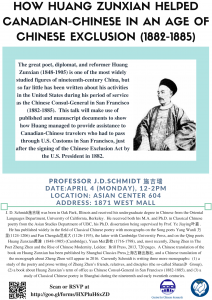About the Event


About the Speaker
J. D. Schmidt施 吉瑞 was born in Oak Park, Illinois and received his undergraduate degree in Chinese from the Oriental Languages Department, University of California, Berkeley. He received both his M.A. and Ph.D. in Classical Chinese poetry from the Asian Studies Department of UBC, his Ph.D. dissertation being supervised by Prof. Ye Jiaying叶嘉莹. He has published widely in the field of Classical Chinese poetry with monographs on the Song poets Yang Wanli杨万里(1124-1206) and Fan Chengda范成大 (1126-1193), the latter with Cambridge University Press, and on the Qing poets Huang Zunxian黄遵宪 (1848-1905) (Cambridge), Yuan Mei袁枚 (1716-1798), and, most recently, Zheng Zhen in The Poet Zheng Zhen and the Rise of Chinese Modernity, Leiden: Brill Press, 2013, 720 pages. A Chinese translation of the book on Huang Zunxian has been published by Shanghai Classics Press上海古籍出版社, and a Chinese translation of the monograph about Zheng Zhen will appear in 2016. Currently Schmidt is writing three more monographs: (1) a study of the poetry and prose writing of Zheng Zhen’s friends, relatives, and disciples (the so-called Shatan沙滩 Group), (2) a book about Huang Zunxian’s term of office as Chinese Consul-General in San Francisco (1882-1885), and (3) a study of Classical Chinese poetry in Shanghai during the nineteenth and early twentieth centuries.
Please RSVP here.


